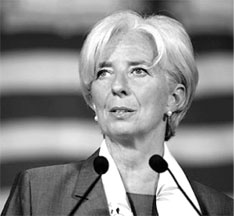IMF chief calls for action to transform financial sector
The head of the IMF, Christine Lagarde, called upon top bankers and
policymakers, last week, to press ahead with reform of the global
financial sector, saying progress still needs to be made in several
areas including implementing regulations and expanding their coverage,
cleaning up bank balance sheets, and resolving the threat posed by
systemically important banks.
 |
|
IMF Managing Director
Christine Lagarde |
Speaking to an audience of financiers and policy makers at the
Frankfurt Finance Summit in Germany, Lagarde suggested that five years
after the beginning of the global financial crisis, reform of the
financial sector had advanced, but that many of the causes of that
crisis had yet to be resolved.
"I believe we are making progress," said Lagarde, but added that
while some measures had been taken, for example to raise capital, "more
needs to be done."
According to Lagarde, "the balance sheet repair needs to be tackled
at the same time as regulatory reform, in a mutually reinforcing
manner." She said weak banks remained a drag on growth while credit to
the real economy was still being hampered.
"Many banks are still shackled by the leftover effects of the
crisis," Lagarde said.
"This is the weak link in the chain of recovery," she said. The
feedback loop between weak sovereigns and future banking sector risks
has to be cut; otherwise, the impact of new rules and institutions on
the flow of credit and economic growth will be limited.
Regulatory reform
The IMF head also highlighted the key regulatory issues on the reform
agenda, including concerns about the delay in implementation of Basel
III in major jurisdictions.
"Different rates of implementation could contribute to dilution of
overall minimum standards," she warned.
She also pointed to the threat caused by large systemic banks that,
given their size, complexity, and interconnectedness, are still
considered 'too-important-to-fail'.
The IMF chief proposed tackling the problem on three fronts:
regulation, such as systemic surcharges, intensive supervision, and
frameworks for orderly failure and resolution.
"There is good progress in these areas, led by the Financial
Stability Board," she said.
Lagarde also raised concerns about national differences in the
calculation of the riskiness of assets, the very basis for determining
the capital needs of all banks, and the success of the new rules. The
two main accounting bodies have not reached agreement on a common
approach. "This is not an academic exercise," Lagarde stressed.
Progress on over-the-counter derivatives has also been disappointing.
"We all agree that wider use of clearing houses will raise
transparency, and make the system safer, but no authorities have met the
deadlines to implement reforms. Recent scandals point to the daunting
complexity of assessing risks in big institutions," she said.
Banking union in Europe
Lagarde recognised the key steps taken so far toward a banking union
in Europe, which she described as aiming at a "single supervisory and
regulatory framework, a single resolution mechanism and resolution
authority, and a common safety net that includes deposit insurance, and
lender of last resort capabilities."
She pointed to the agreement on the Single Supervisory Mechanism and
proposals by the European Community to harmonise regulations on capital
as examples of considerable progress toward a banking union.
But, she also stressed the need for policy makers to "plow ahead with
their 'to do list'."
This includes implementing the common resolution and safety nets with
a coherent, credible backstop, and the swift adoption of various
directives such as the Basel III agreement on capital adequacy.
Full embrace of this union-wide architecture is needed to ensure
durable financial stability, but also to sustain the currency union and
the single market for financial services in Europe.
"Our job today, as policy makers and regulators, is to bring about
change in a more effective, permanent manner, in a way that brings about
a robust set of banks and also reduces the frequency and severity of
systemic busts," she said.
BBC
|



